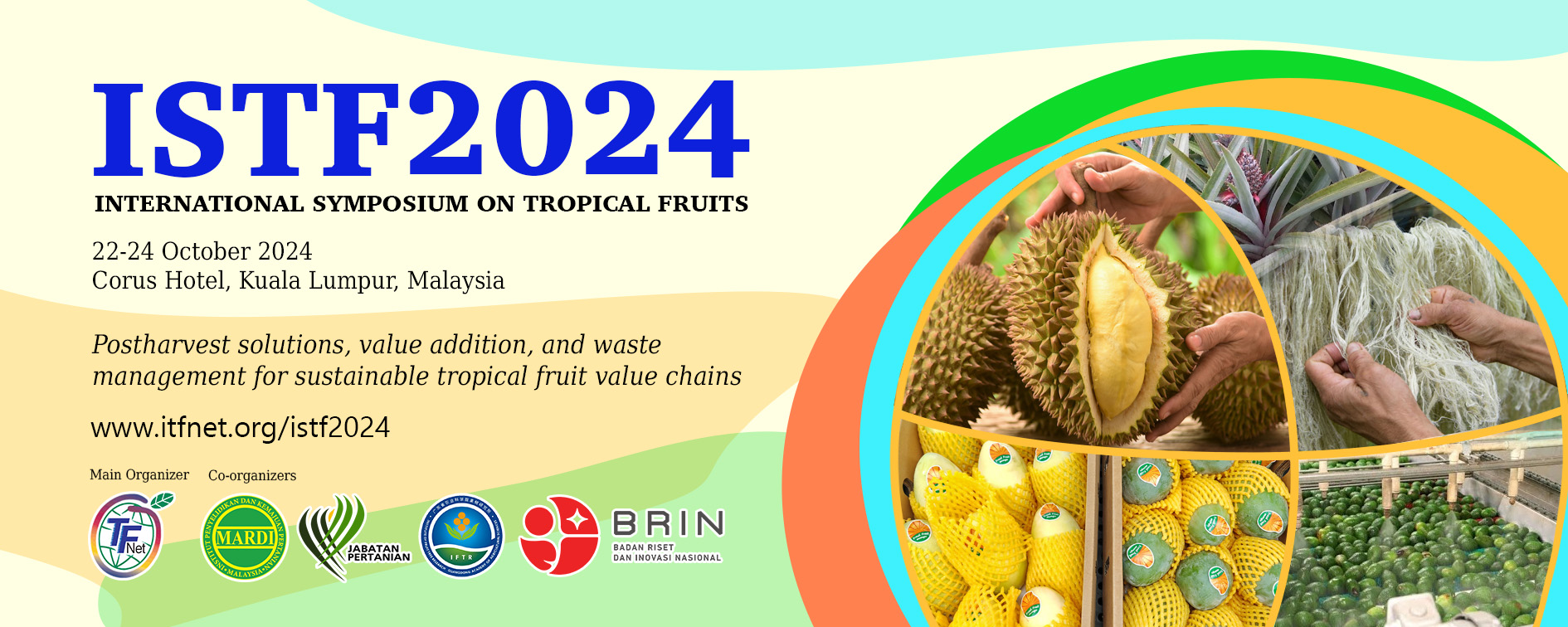DATE AND VENUE
22-24 October 2024
Corus Hotel, Kuala Lumpur, Malaysia
THEME
Postharvest solutions, value addition, and waste management for sustainable tropical fruit value chains
SYMPOSIUM BACKGROUND
The Food and Agriculture Organization (FAO) reports a staggering statistic: over 30% of the food produced, roughly 1.3 billion tons annually, is lost or wasted from farm to fork. The UN’s Sustainable Development Goals (SDGs) aim to halve global food waste by 2030. This target includes not just food waste at the consumer level but also losses that occur throughout the production and supply chain, especially after harvest (post-harvest losses). Post-harvest losses encompass both the quantity and quality of food lost within the system, impacting everything from harvesting, and processing, to storage, transportation, and ultimately reaching the consumer level. Improving post-harvest management and waste reduction in agriculture can further lead to higher economic and environmental gains (World Bank, 2018). Furthermore, the International Food Policy Research Institute (IFPRI) points out that addressing post-harvest losses can significantly contribute to poverty reduction and enhance the resilience of smallholder farmers (IFPRI, 2016)
The situation is particularly concerning for tropical fruits, where the FAO (2011) estimates post-harvest losses to be approximately 32% globally. Post-harvest losses in tropical fruits are influenced by several factors including inadequate handling, poor storage facilities, lack of access to modern technologies, and inefficiencies in the supply chain. Research has highlighted that simple interventions such as improved harvesting techniques and better storage conditions can reduce losses significantly. Furthermore, the literature indicates that integrating modern technologies such as cold chain logistics and controlled atmosphere storage can greatly enhance the shelf life and quality of tropical fruits.
Waste management in the tropical fruit industry also presents a critical challenge. Effective waste management not only helps in reducing losses but also in recovering valuable resources. Studies by the FAO (2013) and the International Trade Centre (ITC) (2014) emphasize the importance of implementing integrated waste management systems that can convert fruit waste into value-added commodities. For instance, byproducts from fruit processing can be used to produce value-added products like pectin, essential oils, and biogas. Thus, integrating advanced waste management practices in the tropical fruit value chains not only mitigate post-harvest losses but also unlocks new economic opportunities, promotes sustainability, and enhances the resilience of the agricultural sector.
The current state of the tropical fruit industry, marked by ongoing post-harvest and waste management challenges, sets the stage for the 2024 International Symposium on Tropical Fruits (ISTF 2024). ISTF 2024 seeks to address the critical issue of minimizing post-harvest losses, and waste, concurrently promoting effective waste management practices. The theme for this year, “Post-harvest solutions, value addition, and waste management for sustainable tropical fruit value chains,” highlights the importance for industry stakeholders to consider these matters critically. The symposium aims to assess these challenges, foster discussions, and explore practical solutions that can be implemented by all.
AIM
The 2024 International Symposium on Tropical Fruits seeks to identify and address the challenges facing the tropical fruit industry and will focus on knowledge exchange around a more efficient postharvest management system linked to opportunities in waste management practices. Specifically, the symposium aims to:
- Share the latest scientific research, technologies, and best practices on postharvest management in tropical fruits.
- Assess new innovations within tropical fruits up and downstream supply/value chains to minimize losses.
- Explore and identify knowledge gaps, research needs, and new opportunities in waste management applicable to tropical fruit stakeholders.
- Share working examples and practical case studies that can be replicated by others.
- Establish networking among stakeholders.
ORGANIZERS
- Main Organizer: International Tropical Fruits Network (TFNet)
- Co-organizers: TBA
THEMATIC AREAS
- Recent advances, technological innovations, and best practices in post-harvest management for tropical fruits.
- Smart, innovative packaging and treatment solutions for maintaining quality and shelf life of tropical fruits.
- Digital applications, IOT and logistical management in food loss measurement, product tracking and traceability.
- Devices, instrumentations, robotics, and drones to determine fruit maturity and improve harvest efficiency.
- Opportunities in waste management for tropical fruits.
- Research and practical solutions in bioproduct development from tropical fruit waste.
- Valorisation of fruit waste biomass and circular bioeconomy.
TARGET PARTICIPANTS
- Value Chain Actors
- Researchers and Academicians
- Large- and Small-scale producers
- Private Companies
- NGOs and Community Representatives
- Government Officials and Policymakers
FIELD VISIT
TBA
PUBLICATION
The main document that will be produced are symposium proceedings (with e-ISBN), including a compilation of key presentations and other information materials. The proceedings will be indexed in CAB Abstracts and Google Scholar.

